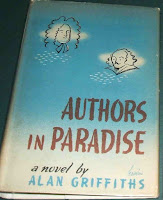 Alan Griffiths (b. Bury St. Edmunds, Suffolk, England, 15 March 1899; d. reg. Lambeth, Greater London, January-March 1950)
Alan Griffiths (b. Bury St. Edmunds, Suffolk, England, 15 March 1899; d. reg. Lambeth, Greater London, January-March 1950)Alan Charles Griffiths was the second of four surviving children of Charles Herbert Griffiths (1874-1950), a commercial traveler in engineering, and his wife Kate Elizabeth Thompson (1872-1960), who were married in Bury St. Edmunds in the spring of 1897.His older sister was Gertrude Kate Griffiths (1898-1982), and his younger brothers were Leslie Neil Griffiths (1905-2006) and Geoffrey Norman Griffiths (1907-1989).
Alan Griffiths published four novels in England, all humorous fantasies after the manner of Thorne Smith, the first two of which achieved American editions. Griffiths supplied some biographical information for the blurb on the rear flap of the first American publication, and as information on Griffiths is rare, it is worth quoting this sardonic piece in full
Alan Griffiths, whose hilarious explorations bring startling news from Heaven, has himself led a quiet if somewhat incongruous life. He began as an apprentice in an iron foundry and put into every casting all the loathing of which his soul was capable.This first novel was Strange News from Heaven (London: Lovat Dickson, 1934; Garden City, New York: Doubleday, Doran & Company, 1935). In it a reverend suffers a stroke and is pronounced dead. But he suddenly returns to life with strange tales of his visit to heaven. It received mixed reviews. While the New York Times called it a "delightfully impudent extravaganza" (21 July 1935), the Boston Transcript complained "not only is the news from heaven strange but it turns out to be rather dreary" (27 July 1935).
At seventeen he went to war in the hope of seeing something of the world. As a result of Ypres he has seen it though one eye ever since.
Later he spent three years in an Indian woolen mill advertising underwear to natives who had no inclination to wear it.
Returning to England he wrote limericks for a patent cheese and got a very temporary job as a postman.
Now he is thirty-five, a bachelor and a novelist with a slight leaning toward Sufism and a stronger leaning toward becoming a millionaire.
US edition
 |
| US edition |
Griffith's third novel came from a third U.K. publisher, as did his fourth, and neither were picked up by U.S. Publishers. The Passionate Astrologer (London: Arthur Barker, 1936) continues in the same vein, as does his final book, Of Course, Vitelli! (London: Methuen, 1938), which achieved some fame in recent years because Jorge Luis Borges reviewed it (in Spanish) favorably, if very inaccurately, soon after publication. (His review was translated into English in Selected Non-Fictions, published in 1999.) In the book a writer invents a person named Vitelli and then writes his biography, while Vitelli's reputation grows until the inevitable happens. I have written about Borges and this book here.
With regard to attested facts in Griffiths's life, he joined the British Army in 1917, and thereafter lost his eye. After the war, he earned a degree in Mechanical Engineering at University College, London. Nothing is known of the last decade of his life.

I'm agree with the points that you've shared.
ReplyDeleteWhat about his youngest brother Eric
ReplyDeleteThe genealogical resources I consulted back in 2017-18 had no mention of Eric.
DeleteEric Noel Griffiths was my father, born 1912 and died 1993. Kate Elizabeth died in the early 1950s and not 1960. Interesting article on Uncle Alan.
DeleteThanks for the corrections!
DeleteHello! I'm so glad to have found this article! During his time at UCL, Alan Griffiths wrote a number of plays and pantomimes, including one called "Flinderella" which I am currently researching. I would love to talk to you about this and find out a little bit more about your uncle - I realise you commented anonymously, but if you see this comment please feel free to reach out and contact me.
DeleteI think this writer has the wrong Alan Griffiths. My uncle didn't attend UCL but I believe he went to Cambridge Uni.
DeleteHello! Having double-checked the archives, he did indeed attend UCL, where he studied Mechanical Engineering - although I don't know if he graduated. I'd be very happy to chat further about this - you can email me at museums@ucl.ac.uk
DeleteFurther to my brother's comments, Geoffrey died in 1944. I believe the brothers' sister was called Betty and husband was called Cyril. I've never heard of Gertrude.
ReplyDeleteIt seems that the family tree I saw those years ago might have mixed in some members of another Griffiths family. The database was at a library--will try to see what it says when I visit there again. Thanks for writing.
ReplyDeleteApologies. My cousin B Griffiths confirms Alan went to UCL.
ReplyDelete